Ilex glabra, inkberry holly, is a upright native evergreen multistem shrub. Inkberry holly blooms spring around June. It is one of the 3 common species of holly in NJ ; the other two are Ilex americana (American holly), and Ilex verticillata (winterberry holly).
Flowers
Like other hollies, Ilex glabra (inkberry holly) plants are dioecous: plants have either male flowers or female flowers on a plant. So inorder to get berries, you need both male and female plants. The only way to distinguish between male and female plants is by their flowers.
The inconspicuous flowers are greenish white and are about a quarter inch across and form in spring. They form at the leaf axils along new branches. The flowers have 5-8 petals
Female (pistillate) flowers: Fertile pistil, sterile stamens
The inkberry holly female flowers usually form singly at the leaf axils along the branch.
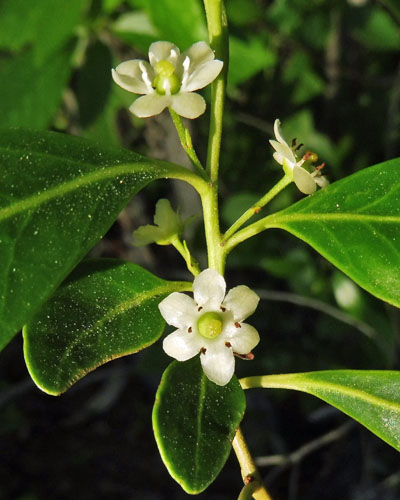
This flower has 7 petals and 7 sterile stamens. The stamens are modified and non-functional. The green ovary is large and is topped with broad large stigma that is fertile. No style.
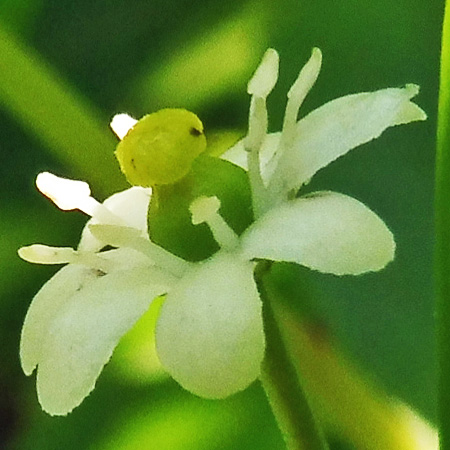
Female flower. There is no apparent style.
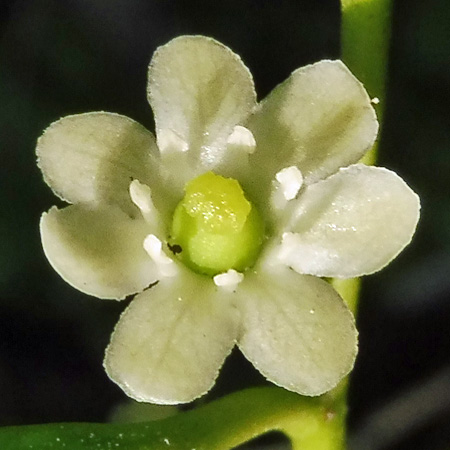
Female flower.
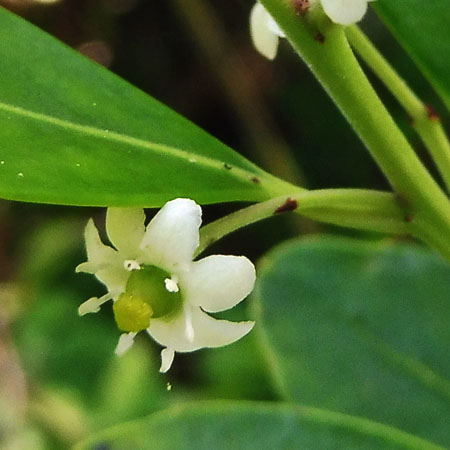
Male (staminate) flowers: Fertile stamens, sterile pistil
The inkberry holly male flowers form in clusters as stalked cymes of 3-5 flowers in the axils of the leaves
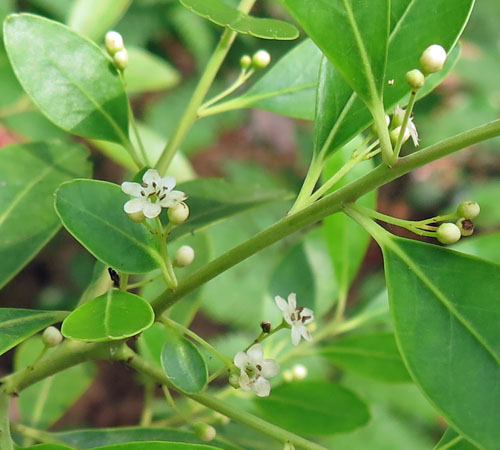
In the photo, the male flower has 6 petals and 6 fertile stamens. The anthers are shriveled.
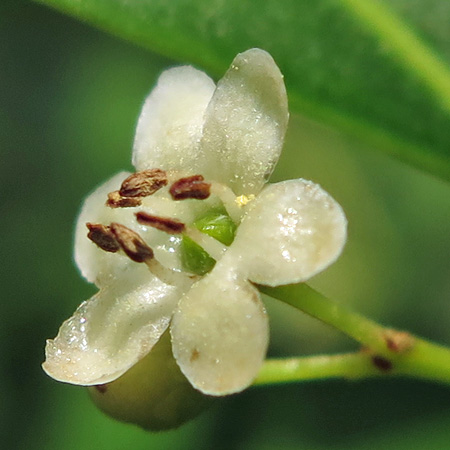
This flower has 6 petals and 6 stamens. These stamens are finished and the modified non-fertile pistil is seen. There is no stigma and the ovary is elongated forming a point at the top.
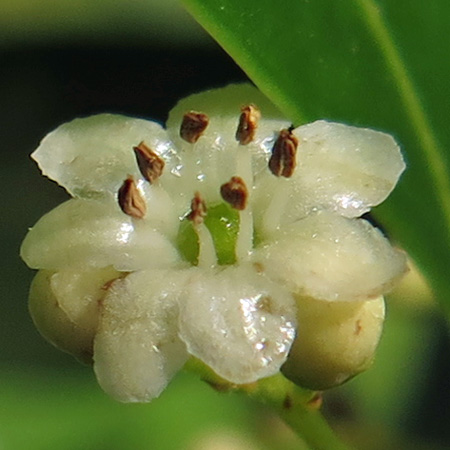
Another male flower.
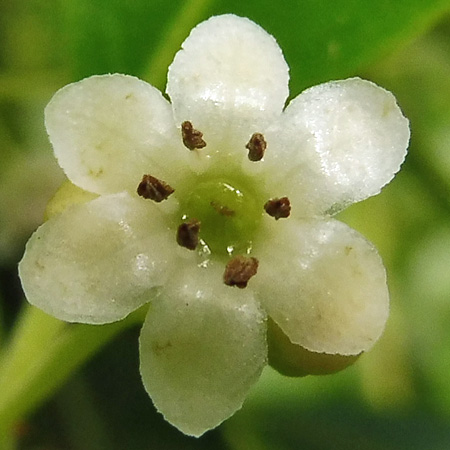
Fruit
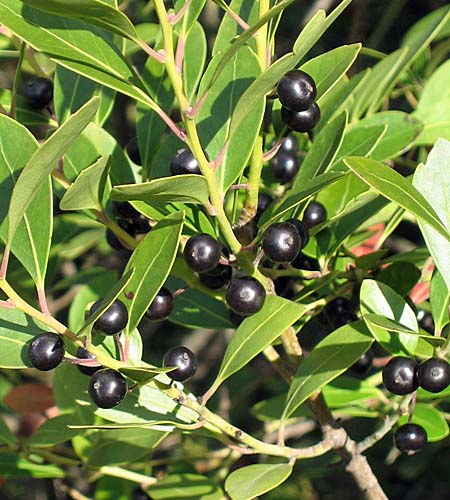 If the female flowers get pollinated, black, berry-like drupes will form in the fall, about 1/3 inch in diameter, and persist throughout winter into early spring unless found by local birds.
If the female flowers get pollinated, black, berry-like drupes will form in the fall, about 1/3 inch in diameter, and persist throughout winter into early spring unless found by local birds.
Leaves and Plant
Leaves: Inkberry holly leaves are simple, alternate, leathery, evergreen, and spineless. The upper surface is shiny and dark green while the lower surface is lighter green and dull. The leaves are around 1 to 2 inches long and .33 to .5 inches wide. Shapewise, the leaves are elliptic (widest at the middle) to obovate (widest above the middle). The margins (edges) are smooth but with a few notches on each side of the leaf tip with a few teeth.
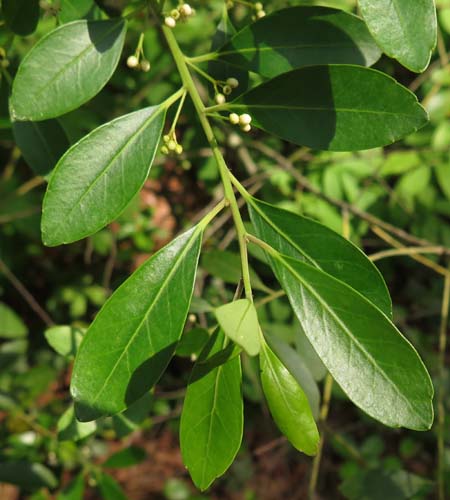
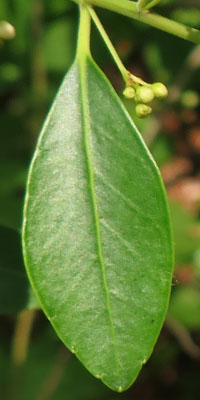
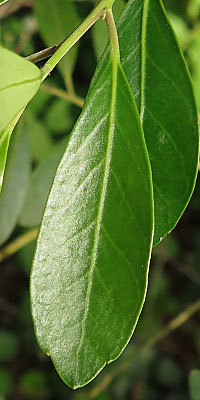
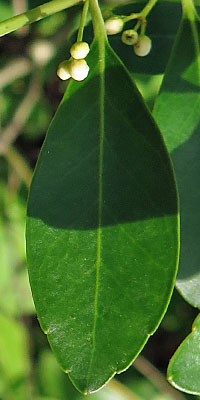
Stem/Bark: Young stems are yellowish-green in color (above photo) and older stems have smooth gray bark (photo below).
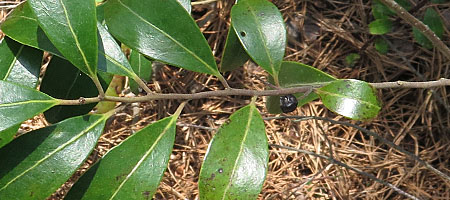
Plant: Inkberry holly is a relatively slow growing evergreen shrub that grows to about 5- 8 feet tall. It sometimes will form clumps with root suckers
Habitat
Habitats include wet areas and water edges
Text by Millie Ling and all photos by Hubert & Millie Ling. Photos: flowers - June 14, fruit - October 15, in cultivation, various parks/preserves in southern Jersey
Cultivation
The cultivation material below is courtesy of
Jersey Friendly Yards searchable plant database: Ilex glabra
Bloom Times: Spring
Hardiness Zone: 6a, 6b, 7a, 7b
Soil Type: Loam, Organic, Sandy, Clay
Soil Moisture: Moist, Wet
Drought Tolerance: Low
Soil pH: Acidic, Slightly Acidic, Neutral
Salt Tolerance: Medium
Optimal Light: Full Sun
Light Range: Full Sun, Partial Shade
Growth Rate: Slow
Deer Resistance: Some
Additional information
Additional information / references:
"Gardeners News" article by Hubert Ling
"The Other Holly"
The USDA website shows its distribution in the US and other information,
https://plants.sc.egov.usda.gov/home/plantProfile?symbol=ILGL
Go Botany:
https://gobotany.nativeplanttrust.org/species/ilex/glabra/
Good gardening information: Jersey Friendly Yards
https://www.jerseyyards.org/plant/ilex-glabra/
Illinois Wildflowers has good descriptions:
https://www.illinoiswildflowers.info/trees/plants/inkberry.htm
Minnesota Seasons has good descriptions:
http://www.minnesotaseasons.com/Plants/common_inkberry.html